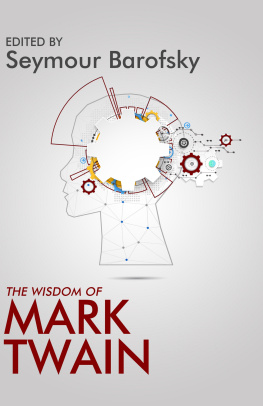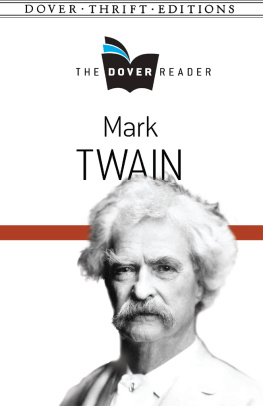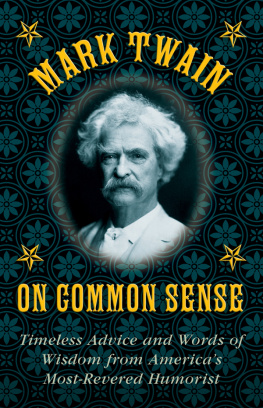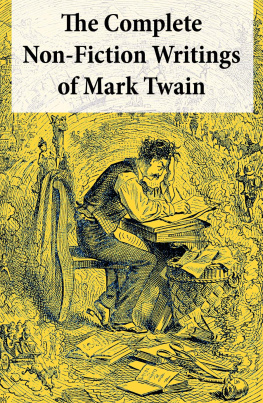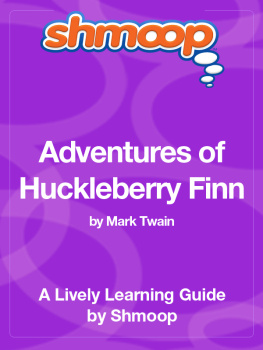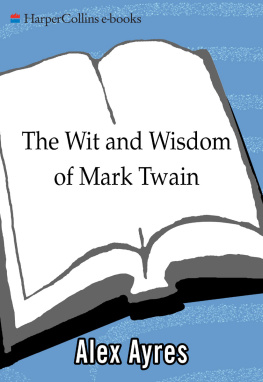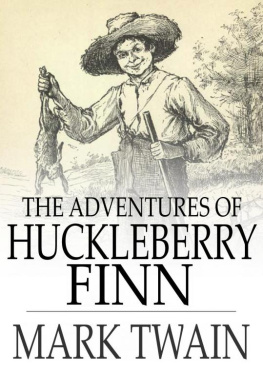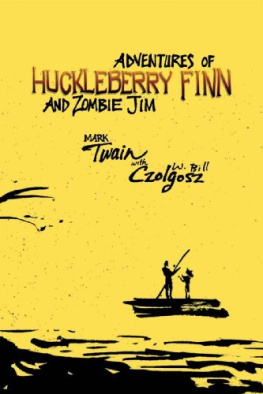Seymour Barofsky - The Wisdom Of Mark Twain
Here you can read online Seymour Barofsky - The Wisdom Of Mark Twain full text of the book (entire story) in english for free. Download pdf and epub, get meaning, cover and reviews about this ebook. year: 2003, publisher: Citadel, genre: Art. Description of the work, (preface) as well as reviews are available. Best literature library LitArk.com created for fans of good reading and offers a wide selection of genres:
Romance novel
Science fiction
Adventure
Detective
Science
History
Home and family
Prose
Art
Politics
Computer
Non-fiction
Religion
Business
Children
Humor
Choose a favorite category and find really read worthwhile books. Enjoy immersion in the world of imagination, feel the emotions of the characters or learn something new for yourself, make an fascinating discovery.
- Book:The Wisdom Of Mark Twain
- Author:
- Publisher:Citadel
- Genre:
- Year:2003
- Rating:3 / 5
- Favourites:Add to favourites
- Your mark:
- 60
- 1
- 2
- 3
- 4
- 5
The Wisdom Of Mark Twain: summary, description and annotation
We offer to read an annotation, description, summary or preface (depends on what the author of the book "The Wisdom Of Mark Twain" wrote himself). If you haven't found the necessary information about the book — write in the comments, we will try to find it.
The Wisdom Of Mark Twain — read online for free the complete book (whole text) full work
Below is the text of the book, divided by pages. System saving the place of the last page read, allows you to conveniently read the book "The Wisdom Of Mark Twain" online for free, without having to search again every time where you left off. Put a bookmark, and you can go to the page where you finished reading at any time.
Font size:
Interval:
Bookmark:
The Wisdom of
MARK TWAIN
EDITED BY SEYMOUR BAROFSKY
Philosophical Library

Kensington Publishing Corp.
www.kensingtonbooks.com
CONTENTS
(From an address delivered on Twains seventieth birthday, December 5, 1905)
(From Adventures of Huckleberry Finn, Chapter 11)
(Address delivered on April 15, 1882)
(In Sketches New and Old)
(In Sketches New and Old)
(Address delivered on February 10, 1887)
(Address delivered on November 13, 1879)
(From What Is Man? And Other Essays)
(An address delivered in November 1873)
(In The $30,000 Bequest)
(Harpers Bazar, February 1910)
(From an address delivered on December 22, 1881)
(Address delivered on December 22, 1876)
(From an address delivered on December 6, 1906)
(From an address delivered on January 22, 1906)
(From What Mr. Paul Bourget Thinks of Us, North American Review, January 1895)
(In Galaxy, May 1870)
(In The American Claimant)
(In Galaxy, May 1870)
(In San Francisco Golden Era, March 18, 1866)
(From Is Shakespeare Dead?)
(Address delivered on July 8, 1899)
(From Chapter 43, Innocents Abroad)
(In What Is Man? And Other Essays)
(Following the Equator, Chapter 51)
(In What Is Man? And Other Essays)
(In Harpers Magazine, October 1914)
(In The $30,000 Bequest)
(Address delivered November 20, 1900)
(A Tramp Abroad, Chapter 50)
(From The Innocents Abroad, Chapter 15)
(From The Innocents Abroad, Chapter 23)
(From The Innocents Abroad, Chapter 27)
(From The Innocents Abroad, Chapter 38)
(From The Innocents Abroad, Chapter 58)
(Roughing It, Chapter 72)
(From Following the Equator, Chapter 68)
Mark Twain (pseudonym of Samuel Langhorne Clemens) was born in Florida, Missouri, on November 30, 1835, and died on April 10, 1910, in Connecticut, where he had made his home from 1871. After leaving Hannibal, the Missouri town in which he had spent his childhood, Twain worked on a Mississippi steamboat and for much of the rest of his life traveled extensively, through America and around the world, commenting on the places and the people he encountered. He was a journalist, a travel writer, a philosopher, a humorist, an accomplished public speaker and, above all, a storyteller and novelist.
In selecting pieces from an enormous body of workwritten and spokenthat might fall under the rubric of wisdom, it was necessary for a volume of this scope to omit much more than it includes. Insofar as possible, the volume tries to include pieces complete in themselves, or nearly so. With the exception of one excerpt, Twains novelseven his greatest, Adventures of Huckleberry Finnare not represented here. In any case, they are perhaps best read whole. What this book seeks to present is a sampling of Twains wisdomexplicit and implicit, funny and entertaining, troubling and thought provokingabout the world he lived in, its people and its ideasa world still recognizable in ours.

I have had a great many birthdays in my time. I remember the first one very well, and I always think of it with indignation; everything was so crude, unaesthetic, primeval. Nothing like this at all. No proper appreciative preparation made; nothing really ready. Now, for a person born with high and delicate instinctswhy, even the cradle wasnt whitewashednothing ready at all. I hadnt any hair, I hadnt any teeth, I hadnt any clothers, I had to go to my first banquet just like that. Well, everybody came swarming in. It was the merest little bit of a villagehardly that, just a little hamlet, in the backwoods of Missouri, where nothing ever happened, and the people were all interested, and they all came; they looked me over to see if there was anything fresh in my line. Why, nothing ever happened in that villageIwhy, I was the only thing that had really happened there for months and months and months; and although I say it myself that shouldnt, I came the nearest to being a real event that had happened in that village in more than two years. Well, those people came, they came with that curiosity which is so provincial, with that frankness which is also so provincial, and they examined me all around and gave their opinion. Nobody asked them, and I shouldnt have minded if anybody had paid me a compliment, but nobody did. Their opinions were all just green with prejudice, and I feel those opinions to this day. Well I stood that as long aswell, you know I was born courteous, and I stood it to the limit. It stood it an hour, and then the worm turned. I was the worm; it was my turn to turn, and I turned. I knew very well the strength of my position; I knew that I was the only spotlessly pure and innocent person in that whole town, and I came out and said so. And they could not say a word. It was so true. They blushed; they were embarrassed. Well, that was the first after-dinner speech I ever made. I think it was after dinner.
Its a long stretch between that first birthday speech and this one. That was my cradle-song, and this is my swan-song, I suppose. I am used to swan-songs; I have sung them several times.
This is my seventieth birthday, and I wonder if you all rise to the size of that proposition, realizing all the significance of that phrase, seventieth birthday.
The seventieth birthday! It is the time of life when you arrive at a new and awful dignity; when you may throw aside the decent reserves which have oppressed you for a generation and stand unafraid and unabashed upon your seven-terraced summit and look down and teachunrebuked. You can tell the world how you got there. It is what they all do. You shall never get tired of telling by what delicate arts and deep moralities you climbed up to that great place. You will explain the process and dwell on the particulars with senile rapture. I have been anxious to explain my own system this long time, and now at last I have the right.
I have achieved my seventy years in the usual way: by sticking strictly to a scheme of life which would kill anybody else. It sounds like an exaggeration, but that is really the common rule for attaining to old age. When we examine the programme of any of these garrulous old people we always find that the habits which have preserved them would have decayed us; that the way of life which enabled them to live upon the property of their heirs so long, as Mr. Choate says, would have put us out of commission ahead of time. I will offer here, as a sound maxim, this: That we cant reach old age by another mans road.
I will now teach, offering my way of life to whomsoever desires to commit suicide by the scheme which has enabled me to beat the doctor and the hangman for seventy years. Some of the details may sound untrue, but they are not. I am not here to deceive; I am here to teach.
We have no permanent habits until we are forty. Then they begin to harden, presently they petrify, then business begins. Since forty I have been regular about going to bed and getting upand that is one of the main things. I have made it a rule to go to bed when there wasnt anybody left to sit up with; and I have made it a rule to get up when I had to. This has resulted in an unswerving regularity of irregularity. It has saved me sound, but it would injure another person.
In the matter of dietwhich is another main thingI have been persistently strict in sticking to the things which didnt agree with me until one or the other of us got the best of it. Until lately I got the best of it myself. But last spring I stopped frolicking with mince-pie after midnight: up to then I had always believed it wasnt loaded. For thirty years I have taken coffee and bread at eight in the morning, no bite nor sup until seven-thirty in the evening. Eleven hours. That is all right for me, and is wholesome, because I never had a headache in my life, but headachy people would not reach seventy comfortably by that road, and they would be foolish to try it. And I wish to urge upon you thiswhich I think is wisdomthat if you find you cant make seventy by any but an uncomfortable road, dont you go. When they take off the Pullman and retire you to the rancid smoker, put on your things, count your checks, and get out at the first way station where theres a cemetery.
Next pageFont size:
Interval:
Bookmark:
Similar books «The Wisdom Of Mark Twain»
Look at similar books to The Wisdom Of Mark Twain. We have selected literature similar in name and meaning in the hope of providing readers with more options to find new, interesting, not yet read works.
Discussion, reviews of the book The Wisdom Of Mark Twain and just readers' own opinions. Leave your comments, write what you think about the work, its meaning or the main characters. Specify what exactly you liked and what you didn't like, and why you think so.

